Man of Steel
Back to Contents of Issue: February 2004
|
|
|
|
by Leo Lewis |
|
|
The nature of the global industry itself is also rapidly transforming. At the beginning of December, US President George W. Bush revoked a series of steel import tariffs which had threatened to unleash a damaging trade war between the US and both Japan and the EU. His sudden backdown ushers the steel industry into a new era -- but it is also highly revealing about the previous one: The US president was protecting US steel companies because they had not evolved into what European, Polish and Asian steelmakers have become.
The rest of the developed world has accepted the pain of dragging an old industry into a new age by biting the steel bullet. That US companies have not done so has meant that their survival depended upon intervention.
Japanese steelmakers -- along with a host of other manufacturers -- have historically been on the receiving end of some very protectionist policies themselves, of course. But they have accepted the new realities of global demand and have spent their time adapting to it, putting themselves in a position where they are now ready to reap the benefits.
JFE was formed by the merger of Kawasaki Steel and NKK, and the quickly integrated company now parades itself, justifiably, as a model of how to perform an industry mega-merger. Helped along by the almighty construction boom in China, the newly merged company has managed to outstrip even the most optimistic of growth predictions and is now poised to deliver even more over the next five years. By market value, JFE is widely considered the biggest steelmaker in the world.
What JFE has done so successfully is to reposition its business as one that offers a significant technological advantage over competitors. Steel is not just steel anymore, and JFE, via plenty of research and investment in new techniques, has cornered the market in the kind of steel grades that most interest automakers and other steel-hungry manufacturers. The "technology cushion" that JFE has created has been a particular strength in China, where explosive economic growth has created an overnight demand for products that cannot currently be produced by Chinese companies.
J@pan Inc recently met with the man at the top of this mighty megalith, JFE president and CEO Yoichi Shimogaichi. In the following exclusive interview, Shimogaichi offers his very personal analysis of an extraordinarily successful globally-oriented Japanese industry.
What do you think the Japanese steel industry will look like in one, five and 10 years?
To be honest with you, I don't think there will be much difference in the steel industry between now and the near future. In Japan, our rival is Nippon Steel. I think we hold a dominant position and it won't change even after Nippon Steel's business consolidation. Our affiliated companies have consolidated, which helped us succeed in lowering costs.
The secret is our technology, which came from both NKK and Kawasaki and is now strongly united. We have good supply conditions. The results are showing in more than just an upturn, and that is a situation that won't change too easily. Although Sumitomo Metals, Kobe Steel and Nippon Steel concluded an agreement, the management of consolidated Nippon Steel won't generate change on a large scale.
We think it is a major factor and we certainly need to keep a close eye on the developing situation in that country. First of all, it's really about a "potential" Chinese market. Where is that big Chinese market heading? How are we going to deal with it? There was a time in the 60s and 70s when Japan hosted the Osaka World Exposition and the Tokyo Olympics. China is right now following the same path with the Beijing Olympics and the Hong Kong Exposition. Accordingly, the big strides that China has been making thus far will not stop, at least until those events have happened.
And the long-term view?
In 10 years the Japanese steel industry will reach excess capacity. So will China's industry, probably. Having said that, it's difficult to tell exactly what's going to happen in 10 years. All major Japanese steel mills stand on the coastline and 40 percent of JFE products are exported overseas. China has a long coastline, but there are few mills standing on Chinese shores. In order for the product to be transported overland, there have to be places where shipments can be unloaded. There are probably only a few Chinese settings which meet the right conditions, and they are starting to build mills at those sites. But I think we're in a better position in terms of cost, and our position can remain stable because of the condition of our markets and our superior technology.
Can you do anything about losing technology to the Chinese?
We can't prevent our technology from being stolen or passed to the Chinese. Providing technology is something that can't be avoided if the global steel industry is to prosper. If we always preserve our lead in technology, it's all right to provide part of our technology to others. By the time they have adopted one technology, we will have developed a new one. Otherwise, the Japanese steel industry will fall into trouble. We can't afford to lose the competition in technology. And I think we're pretty secure at the moment.
The secret of our success is partly that Kawasaki Steel and NKK had the same mindset. I met Kanji Emoto, then the chairman of Kawasaki Steel, at the Imperial Hotel in October 1992. We talked about the future of the Japanese steel industry over a meal. We agreed that consolidation of the two companies was necessary to change the Japanese steel industry and that it was the only way we could succeed. Both companies had lowered costs, but there was a limit to what we could do.
How about the job of merging the two corporate cultures? Some said it could not be done, didn't they?
There was no major fighting over the change of the company name to JFE Holdings. In fact, the change boosted employee morale; employees are proud to work for JFE Holdings. Once employees taste success, they are aware that they are a part of it. NKK was only half the size of Nippon Steel. But JFE Holdings is as large as its rival. We have begun to realize that it takes people to lead a company to success.
You have to remember that most of today's dynamic steelmakers were once government owned. Historically, private steel companies have been active only in Japan and the US. Nevetheless, US steelmakers are not much different from state-owned companies: The government protects them. We Japanese steelmakers don't carry Japan on our shoulders. We [Kawasaki Steel and NKK] were both private firms, thus we get on well. Mergers are a mixed experience. For example, Daimler-Chrysler is not doing well, but Nissan is very successful.
As for marking up goods, we've raised the prices over the past 12 months, so we're getting close to the limit. It's impossible to keep on raising prices. I don't think there will be much chance to raise prices in the future.
The critical thing is establishing how a favorable level of pricing can be stabilized. The price of iron ore, the raw material of steel, has been rising.
Do you feel like part of the so-called "Japan Inc." -- a unified national corporate force?
Prime Minister Junichiro Koizumi doesn't do anything for us, so I don't feel we are part of "Japan Inc." The METI is powerless, and has little pulling force. I want Koizumi to demonstrate leadership and think about Japan from a broader perspective.
How about the US tariffs? Were they fair?
I think they were an obvious failure. Even in the US, if the government protects domestic companies and tries to revitalize them under its wings, they become content with the peaceful business conditions provided by the state. Once a rule is made, companies tend to become preoccupied with its manipulation for their self-protection.
But Japan has had its fair share of protectionism as well, hasn't it?
Japanese companies have finally set foot on the world stage. After World War II, they prospered under Japanese government protection. Then they were thrown out into a competitive market, which made them think and plan for themselves -- without government help. Those who have done well and survived the fierce competition are "real" companies, such as Toyota and Canon.
Who do you think of as your biggest rival?
We want to take up a solid position in the Asian market. So our arch rival will be the company that becomes the strongest steelmaker in Southeast Asia. We look to the pan-Asian market rather than the domestic one. So financing is an issue, especially the cost of employment here in comparison with labor costs at other powerful Asian steelmakers.
What would you say is the distinguishing characteristic of JFE?
What is the characteristic of JFE Holdings? [laughter] ... Well, steel is a commodity and therefore not much distinguishes us from others. But I suppose if we had to pick something, it's our people. We place a lot of weight on our workers and think of their happiness. They became one force for the company.
Who are your most important customers?
JFE Holdings has an overwhelming interest in the automobile industry, and only a small interest in the construction industry. The biggest users of our steel are automakers and companies in the shipbuilding industry.
We have reduced the scale of the administrative department, but the R&D is on the same scale as before. People are our core and technology is the key, thus there is no change in the R&D department. I'm determined to move ahead of other top steelmakers. If we can do that, JFE's future will be bright.
What is your general outlook for the Japanese economy?
To improve the Japanese economy, Japanese politics needs steering in a different direction. We need to stimulate domestic demand. Otherwise, the economy won't get better.
The Koizumi method won't boost the economy. China and the US -- countries with growing populations -- are attractive markets. A country like Japan with a declining population and demand is unattractive. Thus demand has to be generated intentionally. There are plenty of ways to do this, such as deregulation or reform of the tax system. If necessary, money needs to be spent. The financial industry needs to be sound and stable, but that won't necessarily boost the economy. That's why the Chinese market is vital. It's not sufficient to look to demand in the domestic market.
Which business leaders do you respect?
There is nobody I respect. There is no point in respecting someone. I can't be that person.
It used to be difficult to recruit talented young people to the steel industry. When the popularity of steel was on the decline, we couldn't get people with great potential. However, that's changed since we became JFE Holdings. I think we can say we've succeeded in recruitment as well.
Gradually we are hiring talented people. JFE Holdings has an affiliated engineering company and other businesses that deal in products other than steel. That is part of the reason for our growing popularity.
How about your own background?
When I started looking for a job, steel seemed to be a growing industry. It was an era before the mass production of cars. The shipbuilding and cement industries were healthy, with promising futures. I passed the exam to become a civil servant. But I didn't like bureaucrats and so gave up. I seriously thought of becoming a banker, but eventually came to the conclusion that bankers are the same as bureaucrats. I didn't join a trading company because I wasn't good enough at English. NKK was located in Kawasaki, which meant I could stay in Tokyo where I was born and raised.
What do you make of Japanese politics?
Ichiro Ozawa suggested a two-party system more than 10 years ago. It seems to be finally taking shape. I think if a leader with charm emerges, Japan can change. Voters need to have a genuine interest in politics and must vote. What makes people lose interest in politics is the deeply rooted idea that the LDP will win whether they cast a vote or not.
It's better that there are few competitors in a market, rather than a large number. A smaller number creates free competition in a real sense and generates vitality. These days Japanese firms have to look to the world, so this is even more important.
We also have to be prepared for the time when the next economic fluctuations come. A big part of JFE's success was China. Great demand in steel materials in China did us a lot of good. There will be no more consolidation in the industry. Of course, if the steel industry gets itself into a bad fix, something might happen. But as long as things keep on going like they are now, we'll be fine. @ |
|
Note: The function "email this page" is currently not supported for this page.


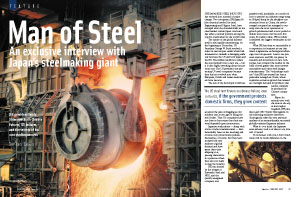 THE JAPANESE STEEL INDUSTRY has stormed into a period of major change. Two companies, JFE (Japan Fe [the chemical symbol for iron] Engineering) and Nippon Steel, have emerged from the thunderclouds as the clear leaders within Japan. And each has taken a central position among the top five steelmakers in the world today.
THE JAPANESE STEEL INDUSTRY has stormed into a period of major change. Two companies, JFE (Japan Fe [the chemical symbol for iron] Engineering) and Nippon Steel, have emerged from the thunderclouds as the clear leaders within Japan. And each has taken a central position among the top five steelmakers in the world today.
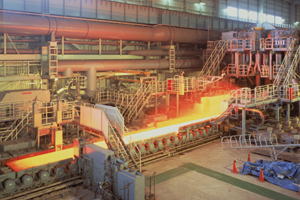 How important is the Chinese market to your future growth plans?
How important is the Chinese market to your future growth plans?
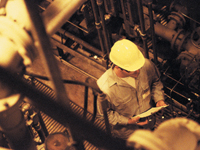 What is the secret of your success?
What is the secret of your success?
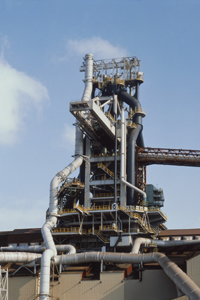 How are you proposing to regain your old pricing power?
How are you proposing to regain your old pricing power?
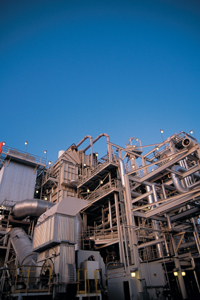 What have you done to cut costs post-merger?
What have you done to cut costs post-merger?
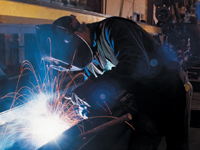 How do you go about recruiting new people?
How do you go about recruiting new people?
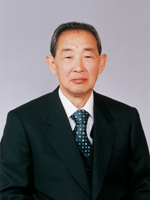 Do you now foresee a steel industry with just a handful of very large players?
Do you now foresee a steel industry with just a handful of very large players?



